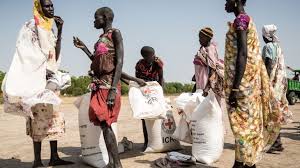The World Food Program (WFP) said it is facing an unprecedented funding gap of $426 million for its operation in Ethiopia.
Across Ethiopia, over 13.6 million people are estimated to be food insecure due to the prolonged combined effects of drought, flooding, desert locust invasions, market disruptions, high food prices, and the COVID-19 pandemic, UN said Tuesday in a statement.
The situation has only been made worse by the recent conflict spreading across northern parts of the country.
WFP said it needs the extra $426 million to expand its emergency food assistance response over the next six months. The funds would also provide long-term food security solutions for people as they enter the yearly ‘hunger season’.
This month, WFP started delivering emergency assistance to communities in regions bordering war-torn Tigray. So far, the conflict has forced 300,000 people from their homes and 1.7 million into the nextdoor provinces of Afar and Amhara.
In coordination with Ethiopia’s Federal and Regional Government authorities, the goal is to reach 530,000 people in Afar and 250,000 people in Amhara. The operation will scale up as needs increase and funding is received.
In Tigray, food security continues to worsen, and WFP and its partners are struggling to scale up and meet the urgent food needs of 5.2 million people, it said in a statement.
MG/abj/APA


